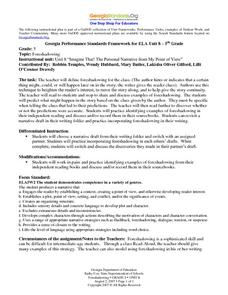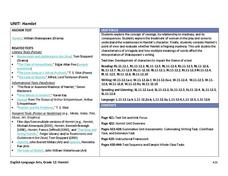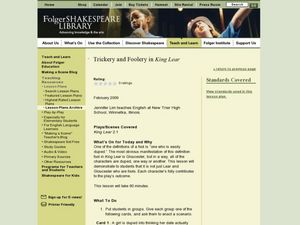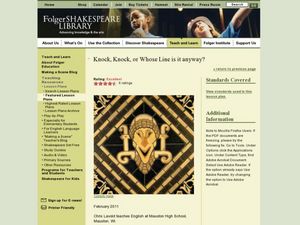Curated OER
"Set Your Heart At Rest" Word Plays
Students read Shakespeare's "A Midsummer Night's Dream." They create a dramatic reading of Titania's monologue in Act II by randomly assigning words of the monologue that are demonstrated using sound and movement, not the actual words. ...
Curated OER
Lose the Lute!
Students use Shakespeare's plays to add modern music to match the mood in the play. They assign adjectives to the original songs of the play and find a song with the same mood. They work together to role-play the play with new music.
Curated OER
Like, Wow
High schoolers read Hamlet. They read again and hunt for a word that appears 4 times. They identify the word "like" and define it. Volunteers act out the scene and they discuss the uses of the word like. They discuss the senses and...
Curated OER
Can't Buy Me Love?
Students activity find the multiplicity of meanings buried within Shakespeare's language. They examine how the meanings of words differ in modern America and in Venice.
Curated OER
Measure for Measure: Are You Talkin' to Me?
Young scholars rehearse and perform an exchange from act three, scene two of the play, Measure for Measure, in pairs. They read the lines from the point of view of a different character in the play, and perform for the class.
Curated OER
Performing Sonnets
Young scholars use Shakespearean sonnets as part of a poetry analysis lesson. In this sonnet lesson, students perform a sonnet by Shakespeare but treat it as a script to be acted out. Young scholars work in pairs to create motions for...
Curated OER
Mapping Shakespeare
Twelfth graders read a Shakespearean play focusing on a character. They create "Mind Maps" of their characters and act out a selection of the play.
Curated OER
Introduction to "As You Like It"
High schoolers explore the character relationships and their connection in the play "As You Like It." Working in groups, students act out the various scenes from the play and discuss the characters and their actions in the scene. High...
Curated OER
Blow, Crack, and Rage
Students add punctuation to a passage from King Lear and compare their version to the First Folio version. In this Shakespeare and punctuation lesson, students discuss the difference punctuation can make on a set of words. Students add...
Curated OER
King Lear- Cut a Scene
Students determine the most critical elements of King Lear, Act I using a Silent Scene Model. In this King Lear lesson, students will create a silent scene based on a scene from Act I of King Lear and act out their scenes for the class.
Curated OER
You Should Not Have Believed Me: Hamlet
Students discuss the sanity of Hamlet and Ophelia in Shakespeare's Hamlet. Students analyze an image from the play to address the sanity of the two characters. Then students read the text to determine whether the characters' words and...
Curated OER
Trust
Students read and discuss Romeo and Juliet Act IV, Scenes 1 and 2. They compare the unfolding action with yesterday's predictions. They consider the concepts of trust, fate, and self-determination.
Curated OER
Foreshadowing
Learners read and discuss Act V, Scene 1. They define foreshadowing and identify examples of it from the text. They edit a partner's diary entry. They identify key ideas from the scene.
Curated OER
Much Ado About Nothing Masks Lesson
Students examine the personality traits of characters. In this characterization lesson, students read act 2 of "Much Ado About Nothing" and create masks to represent the characters in the play.
Curated OER
Comparing Shakespearean Film Adaptations
Though this lesson deals specifically with Hamlet and its themes, many of the strategies and approaches here may be used with most any of Shakespeare's plays that have been adapted to film. Viewing clips of the same Shakespeare scene in...
Louisiana Department of Education
Unit: Hamlet
Encourage readers to determine if Hamlet's madness is actually divinest sense. Class members analyze the words of the play before studying related texts, including T.S. Eliot's "The Love Song of J. Alfred Prufrock," scenes from...
Curated OER
Othello
Students find evidence to support reasons why Othello's insecurity makes him weak. In this Othello analysis lesson plan, students find evidence to support Othello as a strong person at the beginning of the play. Students use the given...
Curated OER
Who is Gertrude, Really?
Students form opinions about Gertrude by imaginatively creating 5 entries for Gertrude's journal. Each journal entry reveal much about Gertrude's character at pivotal moments in the play.
Curated OER
Guess that Scene: A Review of A Midsummer Night's Dream Through Performance
Students rewrite and perform various scenes from the play, A Midsummer Night's Dream. In groups, they include the main quotes and ideas from their scene, perform it for the class, and identify which scene each group is performing.
Curated OER
Trickery and Foolery in King Lear
Students act out scenarios in which someone is duped or is made a fool of. In this trickery and foolery in King Lear lesson, students plan and act out a brief scenario and discuss the person who is duped and why. Students relate this...
Curated OER
Knock, Knock, or Whose Line is it Anyway?
Students compare two versions of Macbeth and participate in improvisational acting. In this improvisational instructional activity, students read and discuss the text before watching two different versions of the film. Students...
Curated OER
"Very tragical mirth:" Romeo and Pyramus, Juliet and Thisbe
Students analyze and compare the poetic tools Shakespeare uses in the death scenes of Romeo and Juliet to those of Pyramus and Thisbe in Midsummer Night's Dream.
Curated OER
Stop Action and Assess Alternatives
Students stop action and determine how history may have been altered. In this historical perspectives lesson, students consider how the Cherokee Removal, the Transcontinental Railroad, the Immigration Act of 1924, and the dropping of the...
Curated OER
Feature Column: Virtual Field Trips
Students discover ways to stay healthy by utilizing Internet education software. In this computer technology lesson, students investigate Internet programs that simulate a field trip by showing images and video. Students participate in...

























